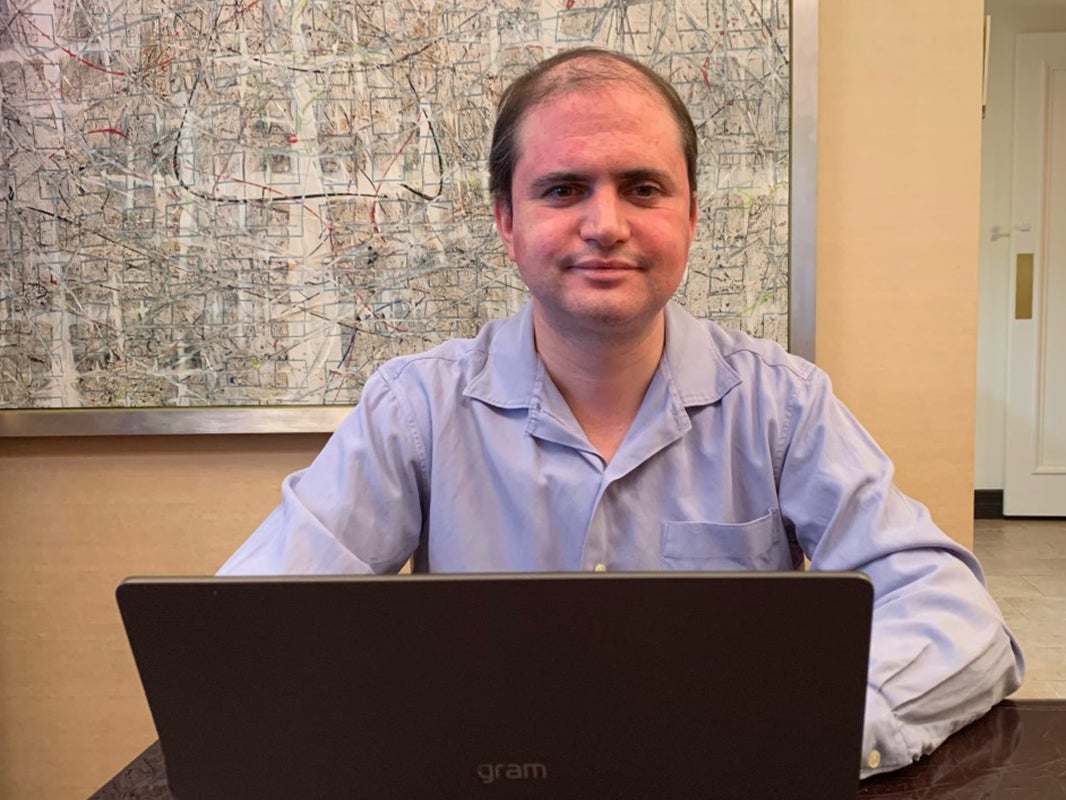News & Highlights
Topics: Bioinformatics, Biomedical Technologies, Five Questions, Informatics
Five Questions with Griffin Weber
A leader in Informatics and creator of Harvard Catalyst Profiles discusses his innovative work to make COVID-19 research data available to the world.

Please note, this interview was originally published on April 27, 2021.
Griffin Weber, MD, PhD is the co-faculty lead for Harvard Catalyst’s Informatics team. He’s an associate professor of medicine and biomedical informatics at Harvard Medical School and at Beth Israel Deaconess Medical Center (BIDMC), where he directs the Biomedical Research Informatics Core.
You accepted the role as chief technology officer of Harvard Medical School in your last year as an MD/PhD student in 2007. How did you get interested in bioinformatics and first involved with Harvard Catalyst?
This is what I’ve wanted to do since I was a student at Harvard Medical School (HMS). I went to medical school with an interest in radiology, but I saw there were many radiologists out there. I had a unique skill set—my PhD is in computer science—and few people were in medical informatics then.
“With Harvard Catalyst support, we created the Profiles Research Networking Software, which is a database of profiles of about 24,000 faculty from HMS, Harvard TH Chan School of Public Health, and Harvard School of Dental Medicine.”
When Harvard Catalyst was first organized, many of us were trying to figure out how all the affiliated hospitals—though competitors for patients and funding—could work together. During that time, I was chief technology officer of HMS, and my team and I received pilot funding from Harvard Catalyst to demonstrate that our query tool called SHRINE (Shared Health Research Information Network) could connect databases across multiple institutions. Today, more than 100 institutions worldwide use SHRINE.
Also with Harvard Catalyst support, we created the Profiles Research Networking Software, which is a database of profiles of about 24,000 faculty from HMS, Harvard TH Chan School of Public Health, and Harvard School of Dental Medicine. Like SHRINE, Profiles is open source and is also used by dozens of other organizations. Both SHRINE and Profiles are tools that investigators use to search beyond the borders of any one hospital, which helps us break down the silos.
How does Profiles power the new COVIDAuthors networking tool you developed?
At the beginning of the pandemic, it was clear that the entire scientific community needed to come together to address COVID-19. For example, I am part of an international consortium called 4CE, which uses electronic health record data to gain insights into COVID-19. It includes more than 100 investigators across different specialties, including informatics, statistics, and clinical medicine. While assembling this consortium, we realized that Profiles software could help facilitate this process.
So, we adapted Profiles to build it around the research needs for sharing knowledge about COVID. As thousands of articles were appearing in PubMed, we sent that information through our Profiles software to automatically generate profiles for all investigators involved in these studies. The COVIDAuthors website showcases the on-the-ground expertise throughout the world, which is essential information for teams who are actively studying the virus and treating patients.
You participated in global consortium studies like 4CE. Are there takeaways that may advance the field of bioinformatics?
For 4CE, we combined data from electronic health records at 342 healthcare organizations internationally to study COVID’s clinical characteristics and sequelae. We asked sites to manually run some database queries and share the results in simple spreadsheet-like files, reminiscent of technology that was in use 20 years ago.
“The COVIDAuthors website showcases the on-the-ground expertise throughout the world, which is essential information for teams who are actively studying the virus and treating patients.”
There were other informatics teams leveraging more sophisticated analytical software or pooling patient data into central repositories, but those approaches take longer to implement and train users. Our approach allowed us to get our first preprint publication out within four weeks. By focusing less on the technology and more on finding a practical solution, we could identify urgent solutions quickly. For example, very early on we could analyze patients with COVID who were admitted to hospitals and determine, based on initial laboratory results, whether the patient would progress to a severe disease state or not.
We also applied this approach to Profiles. There are platforms such as Facebook and LinkedIn that are more sophisticated ways of marketing and matching people. Profiles is simple compared to them, but services thousands of users each day. The technology operating a system doesn’t always have to be the latest and greatest. Sometimes it takes a simple, practical solution to make a meaningful impact.
What’s your next big challenge?
With COVID, it will be addressing the long haulers, those with post-disease sequelae of COVID. Even as more people get vaccinated and the number of new cases decrease, we will still be left with millions of patients who are suffering from long-term effects of COVID.
4CE is pivoting to focus on this, as are many other informatics efforts around the world. What’s interesting is how we are all working together on this initiative. It’s a unique time. We’re focused on a single topic, but are each using different but synergistic approaches.
What do you like to do in your free time?
I have three little kids, aged 6 months, 3, and 5. They keep me busy when I’m not doing this work. Our 6-month-old was born during the pandemic, so we are looking forward showing him what the world looks like outside. We go to playgrounds, but he hasn’t seen our favorite places like the Museum of Science.
Watch the video below for tips on how to use Harvard Catalyst Profiles.

